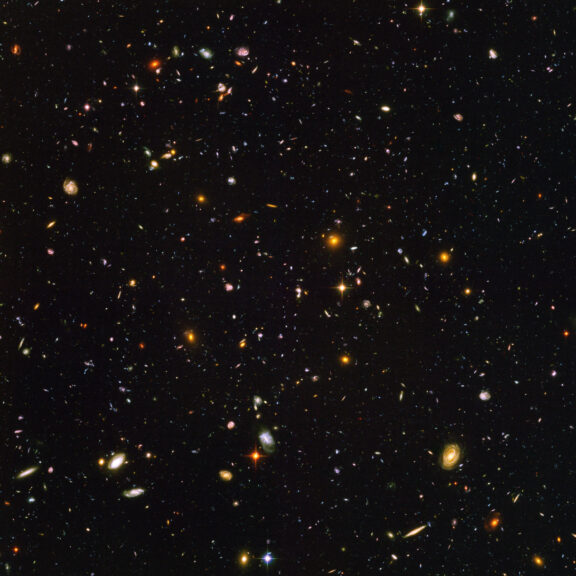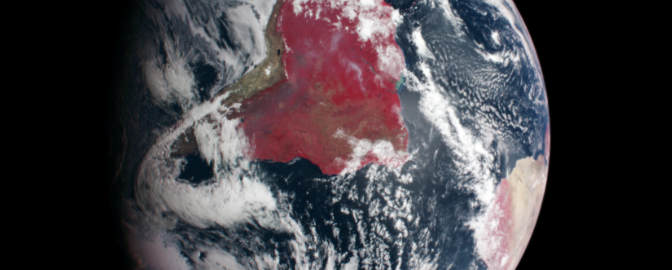A cosmic perspective worth fighting for
What abandoning space science would really mean

Written by
Casey Dreier
Chief of Space Policy, The Planetary Society
September 8, 2025
In fighting the unprecedented, unstrategic, and wasteful cuts facing NASA’s science projects, it’s easy to fixate on the numbers: the billions of dollars cut, the jobs lost, the dozens of missions canceled. It’s understandable; we tend to talk about things we can quantify. But to focus solely on these numbers is to miss an opportunity to reflect on why we care about counting them in the first place.
Bearing witness to space exploration makes us feel something. We see a vista of the Martian surface and we feel the urge to climb the next hill in the distance. We feel the thrill of being among the first humans to see the Plutonian mountain ranges gleaming in a cold and distant Sun. We feel the humility and reverence that quiets the mind when falling into the Hubble deep field image, each point a galaxy of worlds.

As a reader of The Planetary Report, you probably resonate with this experience. Our co-founder, Carl Sagan, certainly did. He understood that the sublime — the flashes of awe or wonder that capture our hearts — is fundamental to the human experience. And the Cosmos, in its unfathomable and ancient vastness, provides access to that experience for anyone of any culture. I believe this feeling is among the foremost “benefits” of space exploration but the most difficult to express in words. But that shouldn’t stop us from trying.
I’ve noticed a trend over the past decade in how we talk about space: an obsession with practical utility, extraction, profit, and how space will enable our material consumption. None of these perspectives is inherently wrong or even undesirable. But to fixate solely on utilitarianism is an impoverished mindset and is ultimately emotionally empty.
How we advocate for space reflects this to varying degrees. Jobs, economic impacts, and workforce development are all important and truly beneficial. But I’ve come to believe that this framing is too narrow. And in so doing, we (including the larger society) have lost the skill at defending, or perhaps even accepting, unquantifiable values. Values like beauty, curiosity, and discovery are inherent in the very act of peaceful space exploration.
This is why space has been a public responsibility for so long. It is rich in opportunities and value that defy our terrestrial expectations of quarterly earnings reports, market cycles, and customer growth curves. This is not to deny the astonishing progress made by the private sector in a number of space activities, but there are limits. The purely commercial markets in space are communications and remote sensing — in other words, in areas where you go up into space in order to point back down, literally reflecting our own thoughts back to ourselves. There’s a lot more to the Cosmos than this.
The Day of Action
This is not a normal year for space advocacy, so we are going all in. The Planetary Society is working with several partner organizations to convene a special “Save NASA Science” Day of Action on Oct. 6 in Washington, D.C. Registration closes in the last week of September, so sign up today at planetary.org/dayofaction.
For nearly 70 years, NASA did the other things — sometimes on its own and more recently, with partners across the globe and in the commercial sector. Discovery-driven science remains a public activity, a unique activity even among other public responsibilities. The tools have changed but not the financial reality. If NASA gets less funding to pursue science, less science will be done.
To countless generations, “space” was the night sky: familiar yet deeply alien, vast yet inaccessible. It inspired them to wonder, to create stories explaining what they saw. These were the heavens, perceived as forever guarding their secrets, lording over humanity. Over time, we improved at deciphering some of these secrets. We grew more clever, and our tools became more sophisticated, but the night sky itself remained out of reach.
Only in the last 67 years has that changed. Our national space agencies, intended to both serve and reflect the public itself, are thus a projection of shared identity into the literal heavens. The symbolism is powerful and universal. NASA is more than a space agency; it’s a mirror of the United States back onto itself. What NASA does — or does not do — is itself a reflection of what our society does — or does not — value.
This is why Sagan helped found The Planetary Society: to fight for the activities in space that ennoble and inspire us, in addition to those that provide immediate practical value. This perspective demands that we reframe the question “What can we take from the Cosmos?” to “What can the Cosmos give to us if we bother to look?”
Breakthrough research starts with YOU!
Your support will empower the next round of STEP grant winners. Make your gift today to fund tomorrow's promising science and technology projects.
DonateThe Planetary Report • September Equinox
Help advance space science and exploration! Become a member of The Planetary Society and you'll receive the full PDF and print versions of The Planetary Report.


 Explore Worlds
Explore Worlds Find Life
Find Life Defend Earth
Defend Earth


